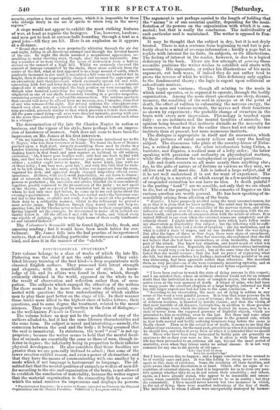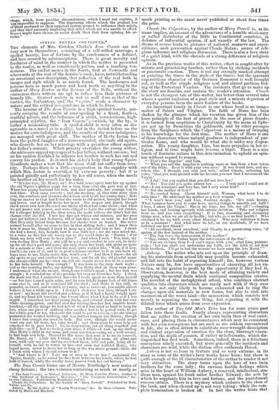PSYCHOLOGICAL INQUIRIES. *
Tins volume belongs to a class of works of which the late Mr. Pickering was the chief if not the only publisher. They exhi- bited literary training of the best kind—a deep acquaintance with classical English authors. They possessed both latent strength and elegance, with a remarkable ease of style. A know- ledge of life and its affairs was found in them, which, though evidently obtained in the world, appeared on the whole to be the result of observation and reflection rather than of occu- pation. The subjects which engaged the attention of the writers for there seemed to be more than one) were chiefly social, con- nected with questions the true understanding of which enables men to play their part better on the stage of life. In their manner these books were allied to the highest class of belles lettres ; their questions, and to some degree the treatment, related to the moral sciences. They were frequently written in the form of dialogue,— as the well-known Friends in Council.
The volume before us may not be the production of any of the authors alluded to, but it has the same literary characteristics and the same form. Its subject is novel and interesting,—namelv, the connexion between the soul and the body ; it being assumed that the soul is immaterial. In strictness, the word " soul " is not ap- propriate; because the writer seems to hold that the mental facul- ties of animals are essentially the same as those of man, though in- ferior in degree ; the inferiority being in proportion to their inferior physical development, lie also considers that these faculties are greater than we are generally inclined to admit ; that some of the lower creation exhibit reason, and even a power of abstraction ; and that they have the means of communicating with one another by a mode which if not language is tantamount to language. The ad- mitted fact that the mental qualities of animals as well as of men dif- fer according to the size and organization of the brain, is not allowed to establish the conclusion of materiality, because the writer argues that the material organization is the connecting link by means of which the mind receives its impressions and displays its powers.
• Psychological Inquiries: in a series of Essays intended to illustrate the Physical Organization and the Mental Faculties. Published by Longman and Co.
The argument is not perhaps (tarried to the length of holding that the " anima " is of one essential quality, depending for the mani- festation of its powers on the organization with which it is con- nected; but .that is really the conclusion. The individuality of each particular soul is maintained. The writer is opposed. to Pan- theism.
It may be thought that the subject is dry, but it is not dryly treated. There is not a sentence from beginning to end but is per- fectly clear to a mind of average information ; hardly a page but is replete with interest for its facts, its subjects, or its illustrations. The feeling of interest in the reader, however, is due to a logical deficiency in the book. There are few attempts at proving those recondite positions the writer wishes to establish and starts with assuming. His arguments, or rather his illustrations of his main argument, cut both ways, if indeed they do not rather tend to prove the reveise of what he wishes. This deficiency only applies to the fundamental theory ; the logic is cogent upon collateral or subordinate matters.
The topics are various ; though all relating to the mode in which mind operates, or is supposed to operate, through the bodily organization. Among the snore direct questions are sleep, dream's, memory, the condition of the soul in syncope or at the point of death, the effect of volition in exhausting the nervous energy, the brain in man and various animals, the nerves and their functions as shown by experiment ; the probable change of structure in the brain with every new impression. Phrenology is touched upon fully : so are instincts and the mental faculties of animals ; the opinion being broached that instincts dwindle as the necessity for them ceases, so that man in the earlier times had not only keener instincts than at present, but more numerous instincts. The dialogue is appropriate in itself and its accessories, which by their pictures of rural scenery relieve and vary the leading subject. The discourses take place at the country-house of Eubu- les, a retired placeman ; the other interlocutors being Crites, a barrister, and Ergates, a medical man of a lofty order ; the latter speaking with precision and authority on physiological matters, while the others discuss the metaphysical or general questions. Life and death concern us all more nearly than anything else ; for be the gifts of nature or of fortune as various as they may, we all live and we all must die. Life is indeed a large subject, and if it be not well understood it is not for want of experience. The act of dying is a mystery, of which except in a few accidental cases of suspended animation we can have no idea. Is death painful ? is the parting " hard " ? are we sensible, not only that we are about to die, but of the parting breath ? The remarks of Ergates on this curious question are worth perusal. He has been speaking of in- sensibility arising from affection of the brain.
" Ergates. I have purposely avoided using the word unconsciousness, for as to that it is plain that we know nothing. The mind may be in operation, although the suspension of the sensibility of the nervous system, and of the influence of volition over the nuncles, destroys its connexion with the ex- ternal world, and prevents all communication with the minds of others. It is indeed difficult to say even when the external senses are completely and ab- solutely closed. I might refer to numerous facts which have fallen under my observation as illustrating this subject ; but the following will be suffi- cient. An elderly lady had a stroke of apoplexy : she lay motionless, and in what is called a state of stupor, and no one doubted that she was dying. But after the lapse of three or four days, there were signs of amendment, and she ultimately recovered. After her recovery, she explained that she did not believe that she had been unconscious, or even insensible, during any part of the attack. She knew her situation, and heard much of what was said by those around her. Especially she recollected observations intimating that she would very soon be no more; but at the same time she had felt sa- tisfied that she would recover ,• that she had no power of expressing what she felt, but that nevertheless her feelings, instead of being painful or in any way distressing, had been agreeable rather than otherwise. She described them as very peculiar—as if she were constantly mounting upwards, and as something very different from what she had ever before experienced.
•
"I have been curious to watch the state of dying persons in this respect ; and I am satisfied that, where an ordinary observer would not for an instant doubt that the individual is in a state of complete stupor, the mind is often active even at the very moment of death. A friend of mine, who had been for many years the excellent chaplain of a large hospital, informed me that his still larger experience had led him to the same conclusion. * * * • "According to my observation, the mere act of dying is seldom in any sense of the word a very painful process. It is true that some persons die in a state of bodily torture, as in eases of tetanus; that the drunkard, dying of delirium tremens, is haunted by terrific visions ; and that the victim of that most horrible of all diseases, hydrophobia, in addition to those peculiar bodily sufferings from which the disease has derived its name, may be in a state of terror from the supposed presence of frightful objects, which are presented-to him as realities, even to the last. But these and some other instances which I might adduce are exceptions to the general rule, which is, that both mental and bodily suffering terminate long before the scene is finally closed. Then as to the actual fear of death, it seems to me that the Author of our existence, for the most part, gives it to us when it is intended that we should live, and takes it away from us when it is intended that we should die. Those who have been long tormented by bodily pain are generally as anxious to die as they ever were to live. So it often is with those whose life has been protracted to an extreme old age beyond the usual period of mortality, even when they labour under no actual disease. It is not very common for any one to die merely of old age—
Like ripe fruit to drop Into his mother's lap.'
But I have known this to happen ; and a happy conclusion it has seemed to be of worldly cares and joys. It was like falling to sleep, never to awake again in this state of existence. Some die retaining all their faculties, and quite aware that their dissolution is at hand. Others offer no signs of re- cognition of external objects, so that it is impossible for us to form any posi- tive opinion whether they do or do not retain their sensibility ; and others, again, as I have already stated, who appear to be insensible and uncon- scious, when carefully watched are found not to be so in reality ; but they die contentedly. I have myself never known but two instances in which, in the act of dying, there were manifest indications of the fear of death. The individuals to whom I allude were unexpectedly destroyed by hannor- rhage, which, from peculiar circumstances, which I need not explain, it was impossible to suppress. The depressing effects which the gradual loss of blood produced on their corporeal system seemed to influence their minds, and they died earnestly imploring that relief which art was unable to afford Seneca might have chosen an easier death than that from opening his ar-



























 Previous page
Previous page